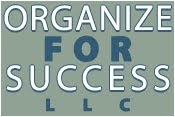Why February? Well, by now, you should have received most (if not all) year-end statements and documents for the prior year, enabling you to prep your income tax return with plenty of time left to track down any missing documents. Plus, since the new year is well underway, last year's active files can be removed completely or moved into archive space, enabling you to open up space for the new year's files to be added.
Utilize this time for purging to prevent overfill of your filing solution so you can locate needed documents and find room for new ones... Using sorting options of KEEP, RECYCLE, SHRED and SEND TO OTHERS, do you know what really needs to be kept and for how long? Establishing specific records retention guidelines that apply to your unique situation can be vital. Furthermore, as you purge your paper documents, think about what are you really using and, for those not used now but that might be used in the future, whether the document be easily recreated or retrieved elsewhere... For details on what tax-related documents need to be retained, visit http://bit.ly/5m34JB.
It is imperative to stash the following items in your safety deposit box or fire- and flood-proof home safe: birth certificates, adoption papers, Social Security cards, citizenship papers, passports, marriage certificates, deeds, divorce decrees, insurance policy papers, lease agreements, loan documents, mortgage papers, personal property appraisals, stock / bond certificates, vehicle titles, copies of wills, powers of attorney papers and death certificates.
Also, as you remove old files and add new files, remember that there is no "right" or "wrong" way to set-up a filing system. The system that will work best for your unique needs & specific personality will depend on the way you categorize information, the type of information you keep, the volume of information with which you interact regularly and whether others in your office will need to access files in your absence.
Finally, make sure those files that you're keeping are labeled clearly and correctly. It can be a balancing act to make sure you have enough files for all your necessary papers while not having so many that it's hard to find what you need, but an effective filing system can significantly improve productivity and efficiency.
Is your filing system meeting your current needs and have you purged unneeded or outdated materials lately?

No comments:
Post a Comment